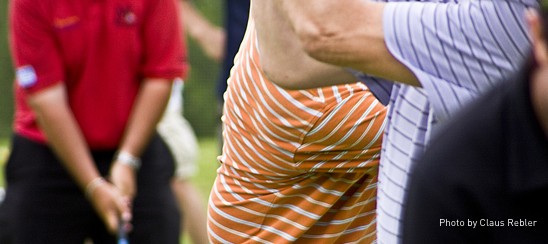How, then, shall we practice?
Blood, sweat, and tears. We all believe the recipe for success exists underneath hard work and dedication. In fact, professionals such as the Sounders’ Eddie Johnson and the Seahawks’ Russell Wilson promote hash tags such as #HardWorkDedication and #ChampionshipOffseason.
In short, the popular sentiment, here, is “practice makes perfect,” meaning, if you put the work in, you will perform well.
Practice Makes Permanent
However, practice makes perfect is incorrect. More accurately, “practice makes permanent.” The more you perform any given task, the more that task will become engrained in your muscle memory.
If you achieve a task using poor form, and continually practice this bad form, you will make bad habits. Sometimes as athletes we get into the habit of going through the motions at practice and this can lead to a worsening of our performance via less efficient movement patterns.
Consider the golf swing, for example, a complicated motion where even the smallest issues make the difference between a drive down the fairway and a golf ball drowning in the water hazard. If you practice your faulty swing, you will more than likely cause more long-term harm than good. Poor movement patterns and mechanics practiced consistently will not lead to better results.
Practice doesn’t make perfect; it makes permanent.
In Search of Perfect Technique
Instead of practicing for practice’s sake, it is important to practice with well-intentioned goals and in a specific manner. When practicing your sport, it is important to remember to perform a perfect technique, always.
Performing a perfect technique does not mean practicing until you have reached a perfect technique and feeling like you’ve achieved your goals. Instead, like elite professional athletes, performing a perfect technique means practicing until you can no longer get the technique wrong.
This concept requires a shift in focus, one that takes years to develop. You are aiming for a step beyond what many consider the goal of practice. Instead of reaching the perfect technique, you want to take your practice that extra step in order to perform a perfect technique continuously.
Once you start applying that technique to your practice sessions, you will work toward perfect technique and then, practice that perfect technique day-in and day-out without getting it wrong.
Practice Perfect Makes Perfect Permanent
The hard work ethic of professional athletes offers much inspiration for those looking to improve in their respective sport. People like Eddie Johnson and Russell Wilson put in the extra work to reach the pinnacle of their respective fields. But they aren’t practicing for practice’s sake. Instead of practicing in order to achieve perfect technique, they add the extra work to practice perfect technique without fail.
Practice doesn’t make perfect; practice makes permanent. For those athletes looking to improve their game, it is important to go a step further.
Practice perfect makes perfect permanent.



